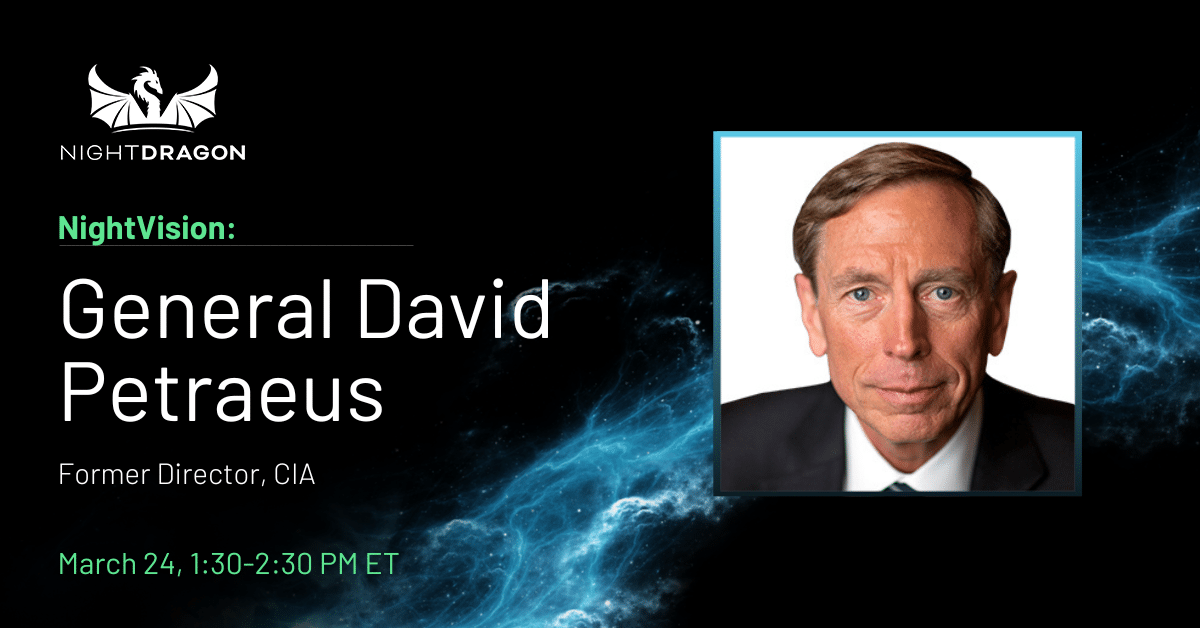Over many decades in public service, General David Petraeus has made a considerable mark on the battlefield and in intelligence, including serving as one of America’s leading battlefield generals and the Director of the CIA. NightDragon Founder and Managing Director Dave DeWalt recently sat down with General Petraeus for a NightVision fireside chat to discuss the domestic and abroad threat landscape, what emerging technologies he’s watching, and lessons in leadership from a long career in public service.
Here are some takeaways from the conversation. A complete video can also be found above.
The Key to Leadership – True effective leadership isn’t one size fits all, General Petraeus said. The leadership style and approach needed for a platoon leader of a group of paratroopers will be different than leading a coalition of international organizations, for instance. He said your leadership style needs to adapt to the group you’re teaching and what will make them effective. “The key is understanding what style is required to bring out the best in him or her in each of those [situations],” he said.
In addition, he said strategic leaders have four different tasks they must accomplish. The first is to get the big ideas to get the strategy right. Then, you must communicate those ideas and techniques effectively through the breadth and depth of the organization to your counterparts, other stakeholders, nations that are contributing leaders, and so forth. Finally, leaders oversee the implementation of those big ideas and provide examples, energy, inspiration, and incentivization.
Leadership’s True Test is Adversity – “Don’t tell me how high the guy jumped. Tell me how high the guy jumped back after he got knocked down. That’s really the test,” General Petraeus said. He said life is not “full of high five moments,” and you must be prepared for members of your organization – or even yourself – to make mistakes. The key is to get up, dust yourself off and keep putting one foot in front of the other until the goal is achieved. “I think the real measure of leadership is actually leading through adversity,” he said. He shared the example of the surge he led in Iraq, where there were real setbacks in the effort for six or eight months, including horrific bombings and loss of life. Yet, after 18 months, violence was down 85 to 90%, and the “country had a whole new opportunity.”
Transitioning from Public Service to Private Sector – Since leaving the government, General Petraeus has taken on several roles in academia and investing and advising companies through his role at KKR and multiple board roles. So far, he has invested in around 25 startups and three or four have become unicorn companies. “I’ve really enjoyed young leaders and big ideas, especially leaders who seem to have the ability not only to conceive of a great idea for a company but also have the promise to be able to scale that company… I find that very exciting,” he said.
Geopolitical Complexity on the Rise – “It may or may not be the most dangerous period since World War II, but it’s certainly the most complex,” General Petraeus said. Balancing plates with allies and partners, as well as relationships with countries like China, Russia, North Korea and Iran and more, must be navigated. “The US has to perform the task of keeping all of these spinning. It’s in our natural interest to do so and try to preserve the rules-based order, the international order, that was established largely with our leadership in the wake of World War II,” he said, adding that it is both a government and private sector effort to do so.
Ukraine as the Future of Warfare? General Petreaus said that the Ukraine crisis has shown some hints of what the future of warfare might look like when it comes to technology. For instance, drone usage has increased, but not beyond the line of sight with significant duration or linked to satellites. “Ukraine is not the future of conflict. It has some little glimpses of the future of conflict,” he said. That said, he called out the impact of smartphones on warfare efforts, giving everyone access to the internet and social media to upload photos, videos, commentary, and other items. “This is the first war that has such extraordinary open-source intelligence possibilities. There’s a degree of transparency about what’s going on in Ukraine that is completely unique,” he said.
Exponential Jumps in Technology Drive New Risk – As technology capabilities continue to grow, like quantum, AI and other areas, new risks inevitably come with them when it comes to changes in warfare and other areas, General Petraeus said. “There will come a moment where it will be machine versus machine, whether that’s machine versus machine on the ground in the air, at sea, subsea, space, or even cyberspace, or all of the above,” he said. In that world, humans can’t operate the machines since they will be too slow to react and must rely on algorithms and other methods. “That’s a scary prospect,” he said. “We have to make sure there are very, very careful safeguards in place.” He said some of this is already playing out in cyberspace, with algorithms running to protect systems that humans don’t operate. He said protections are already being put in place, but these efforts need focus and acceleration as technology continues to evolve.
A full recording of the event can be found above. To view NightDragon’s other NightVision events, visit our Events page.
